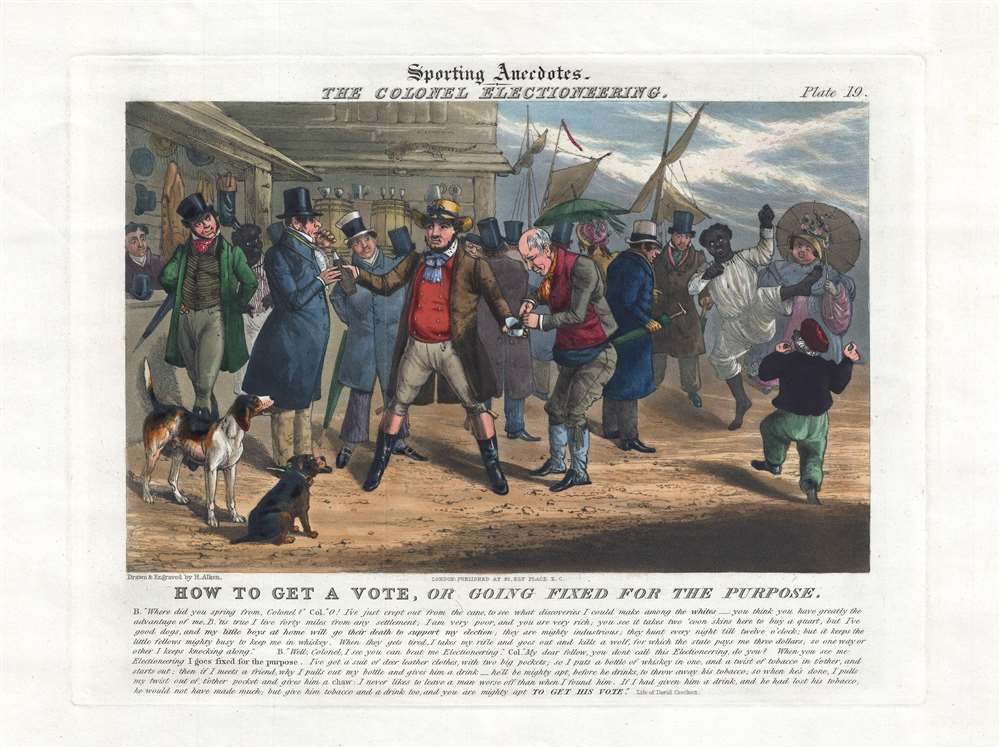This item has been sold, but you can get on the Waitlist to be notified if another example becomes available, or purchase a digital scan.
1835 Henry Thomas Alken Print Satirizing American Political Campaigning
CrockettElectioneering-alken-1835
Title
1835 (undated) 13 x 15.5 in (33.02 x 39.37 cm)
Description
The Satirical Graphic
The print features Crockett at center, a bottle of whiskey in one hand, and a bag of tobacco in another. Crockett's loyal hounds look on in the foreground. In the near background, a dark-skinned man dances for the amusement over overweight Americans. Behind the crowd, there is a hat store, and a bar with large whiskey barrels, and what appears to be a port scene, with ship's sails and possibly a beach. A stripped cat lounges above the bar. The scene strikes us a far more reminiscent of the West indies than Crockett's Tennessee, which of course, had no sailing ships.British Perspective on American Frontier Elections
Below the print a statement, presumably excerpted from the 'Life of David Crockett' expounds upon Crockett's campaigning, in the form of a conversation between Colonel Crockett and one 'B.' The blurb exaggerates Crockett's back country English, references cane fields, (which Crockett is unlikely to have ever seen), and attributes humorous quotes to him,When you see me Electioneering, I goes fixed for the purpose. I've got a suit of deer leather clothes with two big pockets; so I puts a bottle of whiskey in one, and a twist of tobacco in t'other, and start out; then if I meets a friend, why I pulls out my bottle and gives him a drink _ he'll be might apt, before he drinks, to throw away his tobacco; so when he's done, I pulls my twist out of t'other pocket and give him a chaw. I never likes to leave a man worse off than when I found him. If I had given him a drink and he had lost hos tobacco, he would have have made much; but give him tobacco and a drink too, and you are mighty apt to get his vote.While the print is undated, some have suggested in refers specifically to the 1835 election against the Jacksonian Democrat Adam Huntsman (February 11, 1786 – August 23, 1849). Huntsman defeated Crockett for the west Tennessee House of Representatives seat. It was after Crockett conceded to Huntsman that he pronounced his most famous quote,
I told the people of my district that I would serve them as faithfully as I had done; but if not, they might go to hell, and I would go to Texas.One year later, Crockett died in a dramatic last stand while defending the newly formed Republic of Texas against the Mexican armies of Santa Ana.
Publication History and Census
This print was engraved by Henry Thomas Alken and published sometime in the late 1820s or early 1830s in London at 31 Ely Place. It was published as plate 19, part of a series of Alken prints known as 'Sporting Anecdotes.' Today the print is quite rare, with the OCLC identifying only a single example at the Library of Congress. We are aware of 1 other in a private collection.Cartographer
Henry Thomas Alken (October 12, 1784 - April 7, 1851) was a British, painter, engraver, caricaturist, and satirist active in London between 1816 and 1831. Alken was born in Soso, Westminster, the son e of Samuel Alken, another well known artist. He studied painting under his father, and afterwards under the miniaturist John Thomas Barber Beaumont (1774 - 1841). His earliest works were signed under the pseudonym 'Ben Tallyho,' but from about 1816 began publishing under his own name. Most of his work focused on British sporting life, including duck hunting, fox hunting, riding, coaching, etc. However, he was not above political satire often poking fun at the foibles of the aristocracy. More by this mapmaker...

